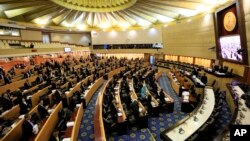Thailand's path back to democracy sustained a major setback Sunday when the military-backed legislature rejected a proposed new constitution, delaying the general elections until sometime in 2017.
The National Reform Council rejected the proposed charter by a vote of 135-105, with seven members abstaining.
Now, a new 21-member drafting committee has six months to redraw the constitution, which must be approved by the legislature before it goes to a referendum, meaning elections will likely not occur until sometime in 2017.
The junta had scheduled elections for late 2016 if the proposed charter was approved by the NRC.
The rejection Sunday by the Thai military-appointed NRC has left Thailand with new uncertainties.
Growing opposition
A 36-member constitution drafting committee (CDC) had spent almost 12 months drafting the document, but faced growing opposition over restrictions on political parties and lack of public debate.
The proposed constitution was denounced by nearly all political parties, saying it would have allowed the military to effectively keep its hold on power.
If the charter had passed, a national referendum was to be held in the months ahead, with national elections in 2016.
Analysts remain cautious about the development, given there had been little public debate or input in the charter drafting process.
Gotham Areeya, a lecturer at Mahidol University, said the military’s “road map” to elections has been delayed.
“There are those who may think that this is a smooth, subtle way to abstain [set aside] the so called roadmap of the National Council for peace and Order [NCPO]. So very automatically the road map is extended for maybe at least six or seven months," Areeya said.
A key area of criticism of the charter from across the political landscape is in provisions for a special military-appointed committee able to take over executive and legislative powers from an elected government in times of political crisis.
Titipol Phakdeewanich, a political scientist from Ubon Ratchathani, said that provision, together with a lack of public debate, is leading to uncertainty whether a new draft will be more democratic.
Criticized
“It’s unclear whether we would actually go back to democracy or not because the draft that has just been dismissed by the NRC [National Reform Council] it was strongly criticized for not being democratic. So this is a question whether the new draft would be a democratic constitution or not. The draft would actually still contain elements to give power to the elite," Phakdeewanich said.
The military and its backers say a new constitution is aimed at ending political party dominance; a feature of the governments under former Prime Minister Thaksin Shinawatra, who was ousted in 2006.
Thaksin is popular among Thailand's poorer citizens, but loathed by its conservative, royalist elite.
In the past decade Thailand has faced an ongoing political divide between Thaksin’s supporters and opponents, leading to repeated street protests and bloodshed in a struggle for power.
When approved, the new constitution will be Thailand's 20th since turning to democracy in 1932.











